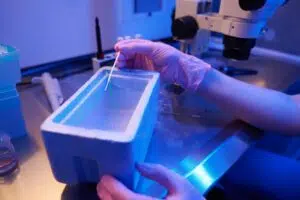Embryo freezing is a method of preserving embryos by rapidly cooling them to very low temperatures using techniques like vitrification, for future use in assisted reproduction.
What is Embryo Freezing?
A successful IVF cycle can result in multiple embryos, and some people choose to freeze the extra embryos for future family building.
Embryo freezing (Embryo cryopreservation) involves using a chemical called cryoprotectant to protect the embryos from cell damage during the freezing process. The frozen embryos are stored and monitored at our lab, where they can be safely preserved for 10 years and even longer.
Why is Embryo Freezing Done?
Embryo freezing offers several benefits:
Future Use: Couples can preserve unused embryos after IVF treatments for future use.
DNA Match for Siblings: Guarantees a 100% DNA match for siblings when using egg, sperm, or embryo donation.
Age-Related Fertility Preservation: Allows women over 35 to use their embryos later without worrying about the decline in their egg reserve.
Needle Phobia: Beneficial for women who are needle phobic or prefer not to undergo additional egg collections.
Cost Efficiency: Avoids the need for repeated stimulation phases, reducing treatment costs.
Who Benefits from Embryo Freezing?
Couples desiring a sibling for their child.
Couples using egg, sperm, or embryo donation who want genetically related siblings in the future.
Couples wanting to avoid additional treatment costs in case of a negative result or miscarriage.
Couples anticipating chemotherapy, which can damage egg and sperm cells.
Couples who prefer not to undergo another fresh IVF cycle or who are afraid of needles.
Transfer of Frozen Embryos
When using frozen embryos to conceive, the following steps are involved:
Preparation: On the 2nd day of her menstrual period, the mother starts taking tablets to prepare her endometrium and folic acid supplements.
Ultrasound Check: After 7 days of medication, an ultrasound examination checks the uterine lining. Medication doses are adjusted as needed.
Further Medication: Another ultrasound is done after 12 days, and a second medication is introduced.
Embryo Transfer: Medication is typically used for 16-18 days. Around day 16, the mother travels to Cyprus for the embryo transfer, which requires a one-day stay.
Follow-Up: Patients may choose to stay in Cyprus for up to three days.
For further information and guidance, please contact one of our coordinators.









